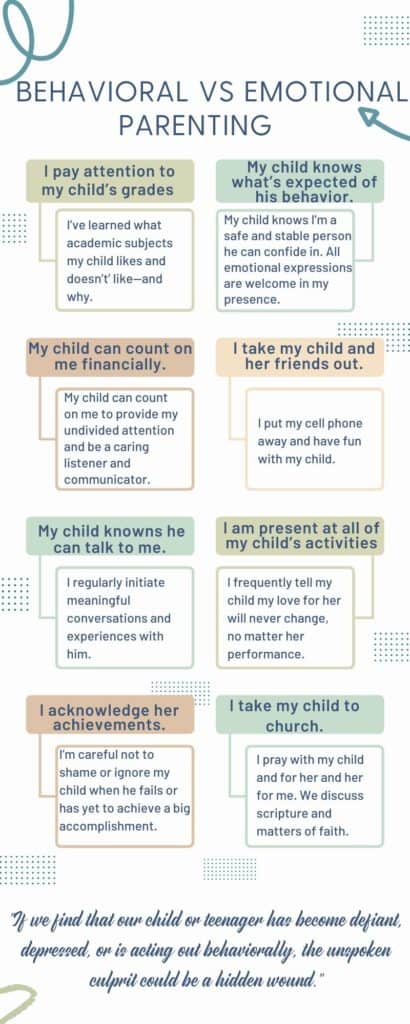


The signs of perfectionism can appear in your child’s behaviors, emotions, and thoughts. Learn how to pair practical steps with emotional investment.
It can be so easy to fall into the trap of perfectionism. It can feel right and good in the moment as you get affirmation and admiration from others, and you feel more in control of life. Yet, it can lead to feeling emotionally and mentally drained.
What about your kids?
I’ll never forget when a teen woman came to my office. She was longing for control and affirmation but was entangled in her self-inflicted perfectionism. Also, she was struggling with panic attacks, depression, and a crippling eating disorder. She was brutally self-critical and had high expectations of herself as she unfairly compared herself to others daily.
Even though this may sound extreme, it provides a picture of what perfectionism can do as it gives an illusion of control. It takes a lot of work to be aware and help untangle ourselves and our children from its life-draining grip.
What Is Perfectionism?
Perfectionism is the fruitless pursuit of becoming someone with no faults or flaws. Perfectionism brings an endless barrage of self-critical and anxious thoughts. Perfectionists pursue almost impossible standards of excellence as they search for affirmation, value, competence, and a sense of worth.
There are two general momentums of perfectionism that either lead to healthy or unhealthy developments in children:
- Love for others: This one involves high standards of excellence to serve and love others well. These are the dedicated contributors that are learning how to balance high standards with the reality that they are not God. They get to learn about boundaries and letting go of the need to be perfect. They learn to do their best out of love for others while learning that relationship is what leads to a connected and steadfast love, not perfection.
- Thirst for love: This one comes from a childhood where a parent’s love was conditional on a child’s performance or behavior. They are stuck and not growing because of the need for affirmation. It’s never enough. This perfectionistic momentum is grounded in selfishness, pride, and the deep need for approval, affirmation, and love from others. This type of perfectionist is a consumer looking to do whatever they need to do to get love and acceptance from other people.
Christian families tend to mix up pursuing perfectionistic behaviors instead of pursuing obedience and surrender. Our imperfections, failures, and weaknesses help us rely more and more on a close relationship with Christ. There can be an increased level of gratitude when we realize the imperfections in ourselves that have been forgiven, which leads to a humble and loving heart. Obedience means pursuing a relationship with Christ that learns to love others well, imperfections and all.
How Do I Know If My Child Is a Perfectionist?
Explore whether you see these things in your child. They are…
- afraid of failing or making mistakes.
- constantly disappointed in what they do or create.
- critical of themselves and others.
- setting very high and unrealistic expectations of themselves and others.
- taking a very long time to complete assignments or tasks.
- avoiding things that may be too difficult to avoid failing or looking weak.
- constantly sad and anxious that they’re not “good enough.”
- extreme rule followers to the point of not enjoying normal life.
- stuck mentally and emotionally.
- defensive or emotional when they feel criticized or that they didn’t meet a certain standard.
The difficulty is that some of these behaviors can be developmentally normal, especially for some personality types, such as the Thinker and Leader personalities. However, there are two main points to consider. The first is if they are setting unrealistically high standards for themselves and/or others to feel a sense of worth or control. Next, the second is if they are impatient and almost intolerant of imperfections in themselves and/or others. If your child is terrified of people seeing or knowing their imperfections or of failing in anything, then they might have signs of perfectionism.
How Do Children Become Perfectionists?
Does perfectionism in kids come from their parents? Is it genetic? Does it come from friends or teachers? Is it contagious?
In general, perfectionism comes from a child’s interpretation of how to feel a sense of worth and love. Also, some children are born with genetic predispositions to anxiety that can cause them to be more prone to becoming a perfectionist. But perfectionism generally comes from a child wanting to feel “good enough” or “better than.”
Unhealthy perfectionism in children can come from:
- a lack of love and affirmation from parents combined with standards the child cannot attain.
- their perception that they need to perform a certain way to receive love from others.
- their embarrassment or discomfort of potentially disappointing others.
- their need to be better than everyone else to gain admiration from others.
There is nothing wrong with having high standards and pursuing excellence in work and performance. However, it is the “why” behind the high standards that makes the difference.
Signs of Perfectionism in Parenting Styles
Research suggests that authoritarian parents (all rules with little to no affection or warmth) are more likely to create an environment of perfectionism. In one recent study, researchers discovered that:
- Moms with perfectionistic tendencies tended to create perfectionism in their daughter(s), but not their son(s).
- Dads with perfectionistic tendencies influenced only their son(s) toward perfectionistic tendencies and not their daughters.
- The perfectionist mothers and fathers were more likely to use the authoritarian parenting style.
- If both the mom and dad are permissive (all love and affection with no rules or demands) and/or authoritarian in their parenting style, they are more likely to influence perfectionism in their daughter.
- An authoritative parenting style, which is the combination of the 7 Traits of Effective Parenting, serves as a protective factor, specifically in girls.
Also, keep in mind that “all rules” parenting leads to legalism and your child needing to earn your love. To effectively curb perfectionistic tendencies, it’s essential to bring warmth, affection, and sensitivity to the guidance and discipline you bring in your child’s life.
Does Social Media Lead to Perfectionism in My Child?
Signs and symptoms of perfectionism has been on the rise since the 1980’s. In my experience, I do believe that social media has played and continues to play a big role in the rise of perfectionism. Children are in constant comparison through social media. In general, social media highlights what is “amazing” or “important.” And people post videos and content in the hopes of generating attention and likes.
Perfectionism is encouraged through social media when it is all about finding ways to get people to affirm or love you. It is a game that never ends and tends to lead to loneliness, emptiness, depression, and anxiety.
On social media, there seems to be a pressure to:
- Have a perfect body.
- Have a prestigious education.
- Have a certain career path that leads to endless success.
- Be wealthy.
- Be the most spiritual.
- Be the best Christian.
An essential step in helping your child overcome perfectionism on social media is to help them realize that there is no need to try to be someone else. This mentality boils down to having a surrendered heart toward Christ that naturally obeys Christ out of love for Him. Each person’s relationship with Christ is unique to their journey as they pursue a relationship with Christ.
In Ephesians 2:10, we are affirmed that we are God’s masterpieces, or His workmanship created to do great things in Christ Jesus. We are designed on purpose and with purpose to love others deeply. From an early age, affirm your children and value the development of their character and uniqueness.
Are Girls More Prone to Perfectionism than Boys?
Yes and no. Researchers have found that elementary girls tend to be more susceptible to perfectionism than boys. In general, research points to females across all ages struggling more with perfectionism than males.
I still remember when my daughter’s third-grade teacher approached me and my wife and said, “your daughter seems to be a bit of a perfectionist.” It was eye opening and important for us to listen to how much of our daughter’s perfectionism came from me and my wife.
I got to meet with my daughter’s wonderful teacher and her aide as we explored some ideas for helping my daughter loosen up and relax in her approach toward flaws and imperfections. We discussed how she could become excited with the possibilities that can be found in imperfections and weaknesses. In all honesty, it helped me pause and reflect. Then, consider how I was doing with my own imperfections and weaknesses.
In my experience, I have found that both boys and girls struggle in their own unique ways with perfectionism. I see more boy athletes struggle with imperfection than girl athletes. And I have noticed more girls struggle with perfectionism in academic settings than boys. However, I do think that perfectionism is a human issue that shows up differently depending on personality, background, and experiences.
Also, our children need to watch us intersect in healthy ways with moments of disappointment, failure, insecurity, and weakness.
- Pray with your son and/or daughter about their desire for excellence and how to become obedient servants of Christ in their excellence rather than players in the game of perfection.
- Help your child reframe their pursuit of attention towards worshipping God through their gifts, talents, and life.
- Finally, this is the way to find contentment, satisfaction, fulfillment, purpose, and peacefulness.
What are the 3 Kinds of Perfectionists?
- Self-oriented (self-inflicted) – This person beats themselves up in their own mind as they pursue unrealistic standards that cannot be attained. They are unable to tolerate personal failure, weakness, and/or flaws.
- Socially-prescribed (socially-interpreted) – This person believes that other people have them under impossible standards or expectations. However, they perceive that they need to meet the standards so that they can be loved or accepted.
- Other-oriented (others-projected) – This person expects other people to be perfect and without any flaws.
All three can be destructive in their own way. The first step in helping you and your family move toward freedom from the trap of perfectionism is realizing that you’re getting dragged into its game. Christians tend to think that having the illusion of perfection means you’re doing well, but Jesus said He died for sinners. He said that in your weakness, you are made strong in Him.
How Do I Help My Child Solve Perfectionism?
First, look at you and your spouse. Are either of you perfectionists? What’s it like in your home? Make sure love is not dependent on performance in your home. Also, take some time to invest in calm and focused relationship with your child.
Here are just a few things you can begin doing to help your child start pulling away from perfectionism:
- Help them see vulnerability, weakness, and failure as opportunities to receive love more deeply and genuinely by others.
- Talk about Jesus dying on the cross and resurrecting as a way to free us from sin and perfectionism and move us into relationship with Him that is not conditional on our performance.
- Being perfect robs a relationship of being able to practice love.
- Celebrate imperfections as opportunities to truly love one another.
- Pursue excellence out of love for others
In general, behaviors are just symptoms of beliefs and perceptions spilling out. Thoughts and emotions dance or work together to form the behaviors we see. Take time to understand what perfectionism is getting for your child.
Are they needing affirmation, control, love, acceptance?
Final Thoughts on Helping Your Perfectionist Child
Explore it with them and then discuss healthier ways to get what they are searching for.
You can read these scriptures with your kids:
Finally, perfectionism can lead to extreme exhaustion. If you as a mom or dad find yourself in this place and want some help, you can speak with one of our professionally licensed counselors at FOTF- 1800-A-FAMILY. For more practical tips and answers to your questions, visit us at www.focusonparenting.com
By Danny Huerta
Published on Wednesday, March 22, 2023 @ 9:55 AM EDT



If you have been wondering, “Why is my good kid, all of a sudden, defiant?” Emotional wounds could be the underlying culprit.
We’re committed to our kids’ character development, teaching them right from wrong, and disciplining them when they chose poorly. We also see to it that their chores get done, along with their schoolwork. We’re there to cheer them on at their performances and games—with our cell phone in video mode. There’s no question we are fully devoted to meeting our kids’ needs.
The hard question to ask is: Am I meeting all of their needs?
Physical vs. Emotional
A newborn needs clothing, nutrition, and proper shelter. But those practical provisions are by no means the full extent of what a baby needs, and will continue to need throughout her childhood. Her soul has needs, known as heart needs. She must receive ongoing emotional nurturance if she’s going to thrive.
The same is true for our teenagers.
Unfortunately, in our busy modern-day culture, it’s easy to lose sight of our kids’ vital need for emotional connection. Their internal craving for nurturance.
It’s entirely possible for some of the most responsible, committed parents to unintentionally neglect to meet their kids’ emotional needs. Which in turn, can create emotional wounds.
Consider the following contrasts:
The Link Between Emotional Neglect (Wounds) and Bad Behavior

Nurturance Conveys:
“Not only do I see you, I delight in who you are.”
“I hear you and what you’re saying matters to me.”
“I know you and I fully accept you—no need to hide in shame or perform to earn my love and acceptance.”
It’s easy to assume our kids know this, but apart from our intentional efforts to say it and show it, our kids likely carry the emotional wound of not feeling fully seen, heard, or known.
Emotional Wounds Need Special Attention
If we find that our child or teenager has become defiant, depressed, or is acting out behaviorally, the unspoken culprit could be the deep emotional wound.
Like lava churning underground, emotional wounds brew beneath the emotional surface, exploding onto the scene in sudden outbursts of anger or acts of rebellion—both bold and subtle.
While discipline most certainly has its place in child rearing, it is not the remedy for emotional wounds. Neither are reprimanding statements spoken in frustration.
Lecturing an emotionally wounded heart is about as effective as planting a seed in concrete.
Transformation starts when we begin forging a stronger relational connection with our child through emotional nurturance.
Unlike a coddling and controlling parenting style, which conveys to our kids that they lack what it takes to face life’s realities and challenges, nurturance fosters the self-worth and empowerment our kids need to face adversity with confidence.
Our nurturance also helps alleviate resentment our kids may be harboring toward us, however subconsciously, that reveals itself as disrespect.
Emotional nurturance is essential to our kids’ personal sense of self-worth. As their self-worth grows, the impulse to rebel and act out tend to decrease. What’s more, their own sense of self-worth naturally causes them to ascribe worth to others. Which leads to virtuous character qualities such as compassion and kindness.
These are all great potential outcomes of emotional nurturance, but what if we feel ill equipped to provide it?
Emotionally Nurturing Parents Must Be Emotionally Nurtured
I was raised by a single mother who worked hard to provide for me and support my extra-curricular activities. I was a mother myself when a sudden avalanche of long-suppressed trauma led to the realization that I had lacked emotional nurturance throughout my childhood—as had my mother throughout hers.
Case in point, we cannot give what we do not have.
So, the process of providing emotional nurturance for our children begins by first receiving it ourselves. Our loving Creator, Father God, wants to nurture our souls, but we must ditch legalistic mindsets and chronic busyness that prevent us from experiencing His love, comfort, and counsel. He also places—or will place, if we ask—nurturing people in our lives who can help model and foster healthy emotional connections with us.
The journey to emotional healing and nurturance is just that—a journey. When we’re tending to our own heart needs, we’re positioned to meet our kids’ heart needs.
Practical Ways to Provide Children and Teens with Emotional Nurturance
INITIATE AVAILABILITY. We must prioritize time with our kids versus giving them the leftover scraps of our time and attention.
- Sit in your child’s bedroom with him.
- Plan a weekly outing with him for ice cream or coffee.
- Spend time with him in the living room with the TV off.
- Have dinner as a family at the table with no background noise or cell phones.
- Go on walks with him.
GIVE UNDIVIDED ATTENTION. Multitasking and nurturance do not mix. Put your cell phone away, and provide your child with the priceless gift of your undivided attention—even if it makes her squirm at first. Make eye contact. Relax. Be aware of your body language—your child should see and sense there’s nowhere you’d rather be than right there with her.
Healing Emotional Wounds
- BE A CARING LISTENER. Of course, there’s a time to instruct and advise, but it’s better received when we’ve first proven to be caring listeners. So, ask questions—a lot of them. Ask your child about his day, his friends, his faith-related questions, his crush, his fears, goals, frustrations—matters that pertain to his heart and beliefs. Resist correcting before first conveying understanding and compassion.
- AFFIRM, AFFIRM, AFFIRM! Verbalize your child’s uniqueness. Tell her the special talents and gifts you see in her. Celebrate the big and small ways she brings joy to your life. Give affirming hugs and pats on the back. And continually reiterate, “There’s nothing you could do that would cause God, or me, to stop loving you. Nothing.”
It may take time for your child—especially a teenager—to begin opening up and being vulnerable with you, but don’t give up! Among all our responsibilities as parents, emotional nurturance is paramount—and among the most rewarding.
By Laura Gallier
Published on Tuesday, March 14, 2023 @ 4:30 PM EDT



The temptation to replace live church with online settles for a lesser-than version of God’s intention for the local body to gather.
Discover the purpose of church and what it could mean for you.
Have you ever sighed while setting your alarm clock on a Saturday night for church the next morning? After a week of waking up early for school, homework and extracurricular activities, sleeping in on Sunday can sound refreshing. There’s always the option to watch the sermon later online, right? So, why not hit the snooze button?
In certain ways, the digital age is a blessing to the church. It allows believers to watch sermons they may have missed and offers an at-home experience for those who can’t travel to a church building. But as we’ve seen with many aspects of life since the COVID-19 pandemic, substituting online options for in-person gatherings brings a different experience. And often it’s a poor substitute for real connection and community. This reality is the same when it comes to attending church.
Why Do We Go to Church?
Imagine sitting in the front row at a concert. You experience the crowd’s excitement, feel the booming speakers and hear an arena filled with people singing at the top of their lungs. Now instead of attending the concert, imagine you decide to watch the show on a phone. While you might be grateful to view the event, there’s no denying the difference between the two experiences.
Likewise, the temptation to replace a local community with online recordings settles for a lesser-than version of God’s intention for the church. God’s purpose for the local body is to gather.
According to Scripture, the church is the local body of believers saved by grace through faith in Jesus Christ. It is God’s creation. He builds it, provides for it and protects it (Matthew 16:18). Paul even mentions that Jesus died for the church and often refers to it as His bride (Ephesians 5:25). Clearly, God loves His church!
After Jesus ascended back into heaven, the body of believers beautifully embodied God’s design for the church. “They devoted themselves to the apostles’ teaching and the fellowship, to the breaking of bread and the prayers” (Acts 2:42). This example defines the purpose of the church today.
The Purpose of the Church
Attending a local church allows believers to worship and study sound teaching with other Christians. It is where we gather to celebrate salvation through symbols such as baptism and the Lord’s Supper. Discipleship groups foster fellowship with like-minded believers who can pray with us, hold us accountable and encourage us in our walk with Christ. Additionally, the church provides opportunities to serve our communities and spread the Gospel.
Maybe you have a knack for hospitality and like to make others feel welcomed. Perhaps you have a desire to organize service projects through your church. Or you might have awesome leadership abilities. You can be certain that the Holy Spirit equipped you with unique gifts to help grow the church. And He wants to use you to encourage and equip other believers.
You’ll never know how the Lord will use you for His glory. So, don’t let fear keep you from building His church. It is our privilege to be part of a local body. But we lose out on exalting God’s glory as a community when we confine our church attendance to an online experience or choose not to participate.
Get Plugged In
Do you want to get involved in a church but aren’t sure where to begin? Here are a few next steps depending on your current involvement:
Start attending weekly services. Or tag along with a friend who’s already plugged into a church. Then, as you become more comfortable, consider joining a youth group. It’s much more enjoyable to do life alongside other believers.
Serve in an area of your church. If you love the squeals of toddlers, ask the children’s director if you can volunteer in the children’s ministry. Or perhaps the Lord has given you a beautiful singing voice, which could help lead others into worship. Your spiritual gifts and passions are no coincidence. You have the opportunity to use them for the Lord’s glory.
Focus on missions. Jesus calls believers to “go therefore and make disciples of all nations, baptizing them in the name of the Father and of the Son and of the Holy Spirit, teaching them to observe all that I have commanded you” (Matthew 28:19-20). Your next act of obedience might be mission-oriented. Maybe you’ve felt called to go on a mission trip to share the Gospel, or perhaps you could start with praying for missionaries throughout the world.
Attending a local church requires time and energy, but the benefits are worth it. When Christ-followers meet for Gospel-centered teaching, worship, community and mission, the church magnifies the beauty and power of Christ Jesus in the world. And you have a hand-picked role in the church to help accomplish this mission.
By Megan Gover
Published on Tuesday, March 7, 2023 @ 4:38 PM EDT



Parents, would you be alarmed if you received a flyer inviting your children to a Satanic after-school club?
As PressConnects.com recently reported, some parents in the Maine-Endwell Central School District (MECSD) in Broome County, New York expressed understandable concern after receiving exactly such a flyer. According to the story, an After School Satan Club is scheduled to meet at Homer Brink Elementary School on 10 afternoons. The club is sponsored by Reason Alliance and by The Satanic Temple, and it claims to offer activities such as arts, crafts, science, and community service projects. A parental consent form is required for participation.
In a letter to parents, Superintendent Jason Van Fossen laid out the reasoning behind the district’s decision to allow a Satanic club to meet on school grounds. The superintendent correctly explained that the district is constitutionally required to offer religious groups equal access to school facilities for after-school clubs and other community activities. Given that obligation, the Satanic club’s request to use school facilities left the district with three options: Ban all non-school organizations from using school facilities, allow facility use by some non-school organizations but not others (which would likely result in legal action), or continue allowing outside groups—including religious groups like the Satanic club—access to school facilities. The district chose the third option. Superintendent Van Fossen noted that the district did not endorse the Satanic club.
The establishment of a Satanic after-school club at Homer Brink Elementary School is not a random or isolated occurrence. In fact, it is part of a strategic effort to thwart the Gospel message. According to the Christian Broadcasting Network (CBN), requests to start Satanic clubs have been made at schools in multiple states. CBN reports that parental opposition to such clubs has “left school administrators with a difficult decision: accept all clubs no matter the viewpoint or shut down after-school clubs altogether.” Mat Staver of Liberty Counsel states that the true purpose behind the Satanic clubs is to push schools to react by shutting down all religious clubs, including Good News Clubs. Sponsored by Child Evangelism Fellowship, thousands of Good News Clubs share the Gospel with children across the United States. The Supreme Court of the United States held that schools that allow outside organizations to use their facilities for after-school activities cannot exclude Good News Clubs from meeting on their premises (see Good News Club v. Milford Central School, 533 U.S. 98 (2001)). A Good News Club was allowed to meet at Homer Brink Elementary School beginning last spring.
Here is the moral of the story: If a Satanic club is formed at your children’s public school, don’t protest. Just pray. Protesting against these clubs plays into the Satanists’ hands. If parents and others protest the formation of a Satanic club, the school might respond by shutting down after-school clubs altogether to avoid allegations of unfairness. That action would not just prevent a Satanic club from meeting at your children’s school; it would also prevent a Good News Club from meeting there and sharing the Gospel of Jesus Christ. Also, it is likely that Satanic clubs will struggle to gain attendees; as Fred Pry of Child Evangelism Fellowship points out, “‘Parents are the gatekeepers for all the clubs in schools. All of them need permission slips signed by the parents…if no children sign up, Satan clubs are not going to exist.’”
By Albany Update
Published on Tuesday, February 28, 2023 @ 5:09 PM EDT



Learn how to approach awkward conversations about sexual behavior with your teen. Explore some tips and strategies for these conversations so you can prioritize your relationship over “getting it right.”
“What is outercourse?” your teen asks one night after your family finished dinner. Despite his or her age, you begin to realize that your teen is losing his or her innocence when it comes to sexual behavior among peers. The first thing for any parent to do in situations involving sexual behaviors is take a deep breath. Push away those images of your once 6-year-old playing with LEGOS or Polly Pockets. Then, welcome the challenge of raising the teen standing before you. Like it or not, you’re in the trenches.
How Far is Too Far with Sexual Behavior?
Outercourse is sex. It entails any form of sexual play that does not involve anal or vaginal penetration. Common forms of outercourse include mutual masturbation, oral sex, body-to-body rubbing, erotic massage, explicit sexual conversation and sex toys. Many sex education curricula, including those provided by Planned Parenthood, promote outercourse to teens as a form of “safer sex.”
This is mainly because outercourse eliminates the possibility of pregnancy and minimizes the risk of contracting many sexually transmitted infections. Outercourse is encouraged as a healthy activity for teens by those organizations. Mainly, because it teaches teens about their bodies and helps them derive pleasure from sexual activity.
With this advice coming from adult “experts,” it’s no wonder that teens are catching on to the idea. And Christian teens are no exception. In fact, I have spoken with more than one teen who has confided that some youth pastors promote outercourse as a viable way to stay pure through the temptations of teen dating.
As a result, Christian teens are getting the message that they can preserve their virginity while enjoying everything but intercourse, and they experience the thrill and intimacy of sex without compromising their purity. This concept is “technical virginity.” To eliminate the confusion around this term, parents must proactively address the issue with teens.
Your teens are desperate for you to help them set boundaries. Questions such as “What is sex?” and “How far is too far?” need to be addressed by you, not a sex-ed teacher, peers or even a youth pastor. Begin by clearly stating that outercourse is sex.
Look up sex in the dictionary, and you will find a wordy biological definition that won’t mean much to a teen getting ready to go on a date. Here’s a definition that should stick: Sex is any behavior between two people that involves stimulating the genitals (this can include touching or explicit talk about sexual arousal).
Platonic vs. Romantic
Help your teens understand that there is a clear difference between platonic and romantic expressions of affection. People naturally express love to parents, children and friends through hugging, a kiss on the face, holding hands or putting an arm around the shoulder. Expressions beyond those, as benign as they may appear, involve stepping down the road toward sexual intimacy.
By nature, romantic physical affection is designed to build toward the process of arousal. Usually, the intended conclusion is sexual release and climax. The intent of outercourse is to provide stimulation and release without crossing the line of intercourse. Even so, it often leads to intercourse because it is so stimulating. Outercourse is obviously sexual in nature and intended for marriage.
Teaching your children about God’s purpose for sexuality is the most important part of this discussion. Make sure you clearly define and answer questions; also talk about God’s awesome creation. Equip your teens in the battle of purity. Begin with an emphasis that they are set apart for marriage. Then, you can go a step further and highlight God’s purpose.
Final Thoughts on Talking about Sexual Behavior
Answering questions concerning outercourse or any sexual matter should always lead to teaching about the incredible gifts of being chaste and reserving sex for marriage. Sexuality is far more precious than most people — especially your children — generally understand.
God created sexual behavior as an intimate bond between husband and wife. Expressing sexuality within a covenant relationship cements a couple’s commitment to one another. Scripture says that it makes two people so close that they become one flesh. This involves not only physical intimacy, but also emotional, mental and spiritual closeness.
God tells people not to engage in sexual behavior outside of marriage because He wants to protect His people. Having sex or sexual contact with someone before marriage creates an emotional closeness. After a break-up, that closeness intensifies the hurt. Sexuality expressed outside of marriage has a devastating effect, chipping away at the emotional wholeness of a person.
Taking initiative in conversations about sex, sexuality, and sexual behavior with your teens will only benefit their development and eventual transition into adulthood. Commit to establishing a strong and healthy foundation for your teen on these topics. Finally, consider how you can come alongside your teen to support and encourage their development in these critical years of their life.
By Juli Slattery
Published on Tuesday, February 21, 2023 @ 4:10 PM EDT


